 W
WArne Arnardo, born Arne Otto Lorang Andersen, was a Norwegian circus performer and -owner, generally referred to as the "circus king" of Norway. He escaped with the circus at an early age, took the stage name "Arnardo", and developed proficiency in several different acts. In 1949, he opened his own circus, under the name of Cirkus Arnardo.
 W
WTom Arnold, OBE was a theatrical producer in the United Kingdom.
 W
WJames Henry Ashton (1819–1889) was a circus proprietor in Australia. He founded Ashton's Circus which is still operated by his descendants.
 W
WPhilip Astley was an English equestrian, circus owner, and inventor, regarded as being the "father of the modern circus". Modern circus, as an integrated entertainment experience that includes music, domesticated animals, acrobats, and clowns, traces its heritage to Astley's Amphitheatre, a riding school that Astley founded in London following the success of trick-riding displays given by him and his wife Patty Jones in 1768. Astley's first competitor was equestrian Charles Hughes, who had previously worked with Astley. Together with Charles Dibdin, a famous author of pantomimes, Hughes opened a rival amphitheatre in London, which Dibdin called the Royal Circus and Equestrian Philharmonic Academy.
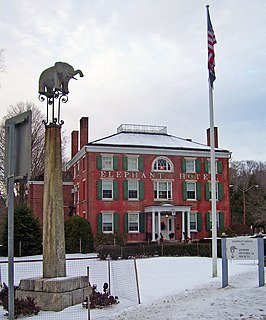 W
WHachaliah Lyman Bailey was the founder of one of America's earliest circuses. In 1808, he purchased an Indian elephant which he named "Old Bet" and which was one of the first such animals to reach America. With "Old Bet" as its main attraction, he formed the Bailey Circus, which also included a trained dog, several pigs, a horse and four wagons. This was the impetus for what in time evolved into the Bailey component of what became the Ringling Bros. and Barnum & Bailey Circus.
 W
WJames Anthony Bailey, born James Anthony McGinnis, was an American owner and manager of several 19th-century circuses, including The Barnum and Bailey Greatest Show on Earth.
 W
WAlpheus George Barnes Stonehouse Sr. was the owner of the Al G. Barnes Circus
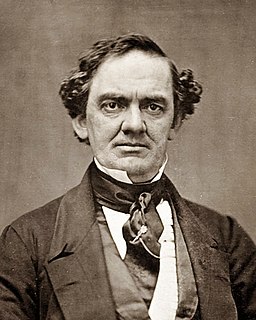 W
WPhineas Taylor Barnum was an American showman, businessman, and politician, remembered for promoting celebrated hoaxes and founding the Barnum & Bailey Circus (1871–2017) with James Anthony Bailey. He was also an author, publisher, and philanthropist, though he said of himself: "I am a showman by profession ... and all the gilding shall make nothing else of me". According to his critics, his personal aim was "to put money in his own coffers." He is widely credited with coining the adage "There's a sucker born every minute", although no proof can be found of him saying this.
 W
WWilliam Batty (1801–1868) was an equestrian performer, circus proprietor, and longtime operator of Astley's Amphitheatre in London. Batty was one of the most successful circus proprietors in Victorian England and helped launch the careers of a number of leading Victorian circus personalities, such as Pablo Fanque, the versatile performer and later circus proprietor, and W.F. Wallett, one of the most celebrated clowns of the era. Also, while in operation for only two years, Batty's most lasting legacy is probably Batty's Grand National Hippodrome, also known as Batty's Hippodrome, an open-air amphitheatre he erected in 1851 in Kensington Gardens, London, to attract audiences from the Crystal Palace Exhibition nearby.
 W
WClyde Beatty was a famed animal trainer, zoo owner, and circus mogul. He joined Howe's Great London Circus in 1921 as a cage boy and spent the next four decades rising to fame as one of the most famous circus performers and animal trainers in the world. Through his career, the circus impresario owned several circuses, including his own Clyde Beatty Circus from 1945 to 1956.
 W
WThe Berousek family is a Czech family, originally from Vilémov, with members who have been circus performers for two centuries. Skills include comedy, puppetry, acrobatics, equestrianism, bear training, tight rope walking, and juggling.
 W
WPaul Binder is the founder, founding artistic director and former ringmaster of the Big Apple Circus.
 W
WThomas Taplin Cooke (1782–1866) was an eminent English showman, born in Warwick, who toured in America as well as his own country. In 1997 Cooke was inducted into the Circus Hall of Fame.
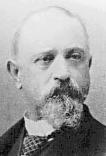 W
WWilliam Cameron Coup was a Wisconsin businessman who partnered with P. T. Barnum and Dan Castello in 1870 to form the "P. T. Barnum's Museum, Menagerie and Circus". Previously Barnum had a museum at a fixed location in New York City and the traveling circus allowed him to bring his curiosities to more paying customers. Coup's innovations were the circus train to transport the materials from town to town. He also came up with the concept of adding a second ring in 1872 and a third ring to the circus in 1881 to allow more people to view the events.
 W
WCharles Dibdin was an English composer, musician, dramatist, novelist and actor. With over 600 songs to his name, for many of which he wrote both the lyrics and the music and performed them himself, he was in his time the most prolific English singer-songwriter. He is best known as the composer of "Tom Bowling", one of his many sea songs, which often features at the Last Night of the Proms. He also wrote about 30 dramatic pieces, including the operas The Waterman (1774) and The Quaker (1775), and several novels, memoirs and histories.
 W
WAndrew Ducrow (1793–1842) was a British circus performer, often called "Colossus of equestrians". He was the originator of horsemanship acts and proprietor of Astley's Amphitheatre and remains one of the few giants of equestrian drama whose name is still familiar in the twenty-first century.
 W
WPablo Fanque was a British equestrian performer and circus proprietor, the first recorded non-white British circus owner in Britain. His circus was popular in Victorian Britain for 30 years, a period that is regarded as the golden age of the circus.
 W
WJoseph Giacomo Ferari was a lion tamer and circus owner at Dreamland on Coney Island.
 W
WAdam John Forepaugh was an American horse trader and circus owner. From 1865 through 1890 his circus operated under various names including Forepaugh's Circus, Forepaugh's Gigantic Circus and Menagerie, The Forepaugh Show, 4-PAW Show, The Adam Forepaugh Circus, and Forepaugh & The Wild West.
 W
WGary M. Green is a musician, author, television host, gaming consultant and entrepreneur.
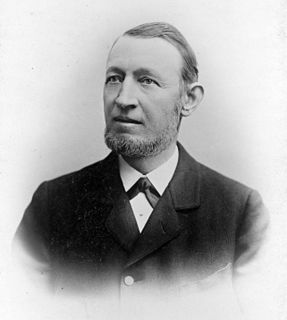 W
WCarl Hagenbeck was a German merchant of wild animals who supplied many European zoos, as well as P. T. Barnum. He created the modern zoo with animal enclosures without bars that were closer to their natural habitat. The transformation of the zoo architecture initiated by him is known as the Hagenbeck revolution. Hagenbeck founded Germany's most successful privately owned zoo, the Tierpark Hagenbeck, which moved to its present location in Hamburg's Stellingen district in 1907. He was also an ethnography showman and a pioneer in displaying humans next to animals in human zoos.
 W
WGeorge Ameen Hamid Sr. is an entrepreneur who made major contributions to America's outdoor amusement and entertainment industry. He established significant productions during the 20th century for fairs, circuses, carnivals and expositions. He is the father of George A. Hamid Jr.. He was born in 1896 in Broumana, Lebanon. He moved to America in 1907 with the Buffalo Bill Wild West show, and later founded the Hamid-Morton Circus with Robert Morton.
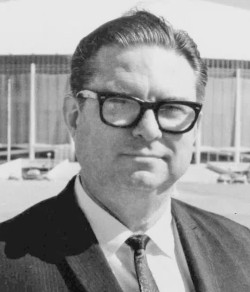 W
WRoy Mark Hofheinz, popularly known as Judge Hofheinz or "The Judge", was a Texas state representative from 1934 to 1936, county judge of Harris County, Texas from 1936 to 1944, and mayor of the city of Houston from 1953 to 1955.
 W
WJohnny J. Jones was an American carnival showman, the founder and manager of the Johnny J. Jones Exposition. The Exposition was one of the first to use steel railroad cars and one of the largest of its kind, exceeded in size only by the Ringling Bros. and Barnum & Bailey Circus. In operation for over 50 years through the continental United States and Canada, the show reached a total of 50 steel cars carrying 100 wagons during its heyday in the 1920s.
 W
WWilliam Kite was a 19th-century circus performer, best known as being the "Mr. Kite" from the Beatles song "Being for the Benefit of Mr. Kite!"
 W
WGuy Laliberté, is a Canadian billionaire businessman, and poker player. Along with Gilles Ste-Croix, he is the co-founder of Cirque du Soleil. In January 2018, Laliberté was ranked by Forbes as the 11th wealthiest Canadian.
 W
WHarry Lewiston was an American showman, freak show director, and barker. He wrote his memoirs under his stage name, published posthumously in 1968 as Freak Show Man: the Autobiography of Harry Lewiston, as told to Jerry Holtman.
 W
WHenry Ringling North was American businessman, as a circus proprietor who was the vice president, treasurer, director and operations chief, while his brother, John Ringling North, was the president and chairman of the Ringling Bros. and Barnum & Bailey Circus, founded by their uncles.
 W
WJohn Ringling North was the president and director of the Ringling Bros. and Barnum & Bailey Circus from 1937 to 1943 and again from 1947 to 1967.
 W
WFriedrich Wilhelm August Pagel aka William Pagel was a ‘strong man’ and South African circus proprietor. He was the second of eight children raised by Antonia Fraudnich and August Pagel.
 W
WStephen Polito (1763/4–1814) was a menagerie owner of Italian descent in Georgian England.
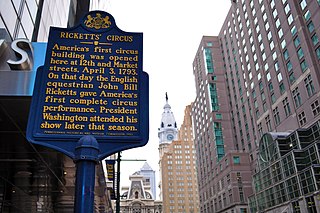 W
WJohn Bill Ricketts (1769–1835) was an English equestrian who brought the first modern circus to the United States.
 W
WThe Ringling brothers were seven American siblings who transformed their small touring company of performers into one of America's largest circuses in the late 19th and early 20th centuries. Four brothers were born in McGregor, Iowa: Alfred T., Charles, John and Henry William, and the family lived in McGregor for twelve years, from 1860 until 1872. The Ringling family then moved to Prairie du Chien, Wisconsin, and finally settled in Baraboo, Wisconsin, in 1875. They were of German and French descent, the children of harness maker Heinrich Friedrich August Ringling (1826–1898) of Hanover, and Marie Salome Juliar (1833–1907) of Ostheim, in Alsace. In 1919, they merged their Ringling Brothers Circus with America's other leading circus troupe, Barnum and Bailey, ultimately creating the Ringling Bros. and Barnum & Bailey Circus, which became a staple of the entertainment world for some 98 years, until 2017.
 W
WCharles Edward Ringling was one of the Ringling brothers, who owned the Ringling Brothers and Barnum & Bailey Circus. He was in charge of production and greatly admired by the employees, who called him "Mr. Charlie" and sought his advice and help even for personal problems.
 W
WSam A. Scribner was an American circus and burlesque impresario of the late Nineteenth and early Twentieth Century. He operated the Columbia Amusement Company, presenting forty or more family-entertainment burlesque shows simultaneously in theaters throughout the Northeast and Midwest of the United States.
 W
WBilly Smart Jr. was a British circus performer and impresario.
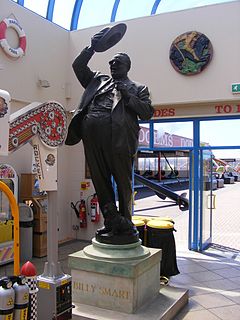 W
WWilliam George Smart Sr. was a British showman, fairground proprietor and circus proprietor, the founder and owner of Billy Smart's Circus.
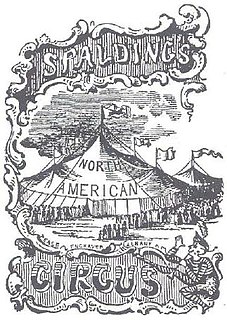 W
W"Dr." Gilbert Reynolds Spalding, sometimes spelled Spaulding, was an American showman, circus owner and innovator, being the first to own his own showboat, constructed the first showboat to contain an entire circus and in 1856 the first to send an entire circus on tour in its own railroad cars.
 W
WIsaac A. Van Amburgh (1808–1865) was an American animal trainer who developed the first trained wild animal act in modern times. By introducing jungle acts into the circus, Van Amburgh paved the way for combining menageries with circuses. After that, menageries began using equestrian and clown performances in circus rings. Gradually the distinction between circus and menagerie faded.